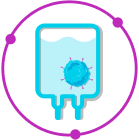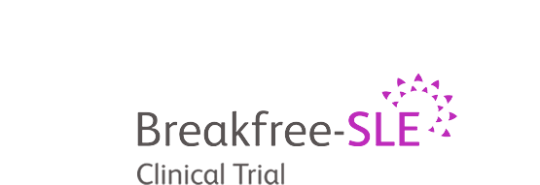CAR T cell therapy: a personalized, one-time infusion1,2
Well-established treatment process
Bristol Myers Squibb is a pioneer in CAR T cell therapy, with more than a decade of experience. Since its initial use in clinical trials in 2010, CAR T cell therapy has been prescribed around the world to treat tens of thousands of patients with hematologic cancers.3-5
CAR T cell therapy is not currently approved to treat autoimmune diseases. It is available only through clinical trials to patients with systemic lupus erythematosus (including lupus nephritis), idiopathic inflammatory myopathies, rheumatoid arthritis, systemic sclerosis, multiple sclerosis, or generalized myasthenia gravis.6-9
Explore ongoing BMS CAR T clinical trials in autoimmune disease: Breakfree-1, Breakfree-2, and Breakfree-SLE.
The CAR T cell therapy treatment process
CAR T cell therapy is administered only at participating clinical trial sites by trained physicians. Completing all 3 steps takes several visits and involves a multidisciplinary team. Throughout the process, there are multiple opportunities for the disease specialist and the CAR T specialist to collaborate on disease identification and patient care.1,10,*
Preparing patients for CAR T cell therapy

Leukapheresis1,11
The patient’s blood is collected and separated into select components. Certain types of blood cells, including T cells, are removed, and the rest of the blood is transfused back into the patient.

CAR T Cell Manufacturing1,11
The collected cells are sent to the manufacturing site. CAR T cells are created and expanded to a therapeutic dose. Quality control testing is performed to confirm cell viability, purity, CAR expression, and the absence of contaminants. Patients may continue immunosuppressants while the CAR T cells are being manufactured.

Lymphodepletion1,10,12,13
Lymphodepletion occurs a few days before the CAR T cell infusion. The regimen typically consists of fludarabine and cyclophosphamide administered over 3 days. Lymphodepletion is required; it may improve the expansion, function, and persistence of CAR T cells by preventing the immune system from destroying the infused CAR T cells and inducing a favorable cytokine environment.
One-time CAR T cell therapy infusion

One-time infusion1,2,14
Patients receive their personalized CAR T cells in a one-time infusion that typically takes up to 30 minutes (infusion times may vary by product or patient).
After the infusion

Monitoring10
After the infusion, patients will be monitored in accordance with applicable clinical trial protocol, which may include coordinated care across multiple specialists. This includes short-term monitoring following infusion at the clinical trial site for any adverse reactions as well as longer-term follow up for continued monitoring of adverse reactions and autoimmune disease status.

Collaborative care is at the heart of the CAR T treatment process15
Patients may be co-managed by a team of disease specialists (eg, rheumatologist, neurologist) and a CAR T specialist leading up to infusion and following the short-term monitoring phase.1
Disease specialists typically identify patients to refer to CAR T cell therapy. The CAR T specialists prepare patients to receive short- and long-term monitoring.10,*
*Patient care and follow-up will occur in accordance with the applicable clinical trial protocol.
Explore ongoing BMS CAR T clinical trials in autoimmune disease.6-9
Trials are open and enrolling participants.

Rheumatology (SLE [and LN])
Phase 2

Rheumatology (SLE [and LN], IIM, SSc, RA)
Phase 1

Neuroinflammatory (MS, gMG)
Phase 1
CAR=chimeric antigen receptor; gMG=generalized myasthenia gravis; IIM=idiopathic inflammatory myopathies; LN=lupus nephritis; MS=multiple sclerosis; RA=rheumatoid arthritis; SLE=systemic lupus erythematosus; SSc=systemic sclerosis.
References:
- Beaupierre A, Lundberg R, Marrero L, Jain M, Wang T, Alencar MC. Management across settings: an ambulatory and community perspective for patients undergoing CAR T-cell therapy in multiple care settings. Clin J Oncol Nurs. 2019;23(2):27-34.
- Müller F, Taubmann J, Bucci L, et al. CD19 CAR T-cell therapy in autoimmune disease – A case series with follow-up. N Engl J Med. 2024;390(8):687-700.
- Bristol Myers Squibb. BMS cell therapy operations and manufacturing. Accessed May 1, 2025. https://www.bms.com/assets/bms/us/en-us/pdf/cell-therapy-operations-and-manufacturing-factsheet.pdf.
- Costa LJ, Kumar S, Atrash S, et al. Results from the first phase 1 clinical study of the B-cell maturation antigen (BCMA) NEXT-T chimeric antigen receptor (CAR) T cell therapy CC-98633/BMS-986354 in patients with relapsed/refractory multiple myeloma (R/R MM). Oral presentation at ASH 2022. Abstract 566.
- Uscanga-Palomeque AC, Chávez-Escamilla AK, Alvizo-Báez CA, et al. CAR-T cell therapy: from the shop to cancer therapy. Int J Mol Sci. 2023;24(21):15688.
- Clinicaltrials.gov. NCT05869955. Accessed March 12, 2025.
- Data on file. REF-00068-466. Princeton, NJ: Bristol-Myers Squibb Company; 2024.
- Clinicaltrials.gov. NCT06220201. Accessed March 13, 2025.
- Clinicaltrials.gov. NCT07015983. Accessed June 11, 2025.
- Beaupierre A, Kahle N, Lundberg R, Patterson A. Educating multidisciplinary care teams, patients, and caregivers on CAR T-cell therapy. J Adv Pract Oncol. 2019;10(suppl 3):29-40.
- Levine BL, Miskin J, Wonnacott K, Keir C. Global manufacturing of CAR T cell therapy. Mol Ther Methods Clin Dev. 2016;4:92-101.
- Turtle CJ, Berger C, Sommermeyer D, et al. Anti-CD19 chimeric antigen receptor-modified T cell therapy for B cell non-hodgkin lymphoma and chronic lymphocytic leukemia: fludarabine and cyclophosphamide lymphodepletion improves in vivo expansion and persistence of CAR-T cells and clinical outcomes [Abstract]. Blood. 2015;126(23):184.
- Neelapu SS. CAR-T efficacy: is conditioning the key? Blood. 2019;133(17):1799-1800.
- Cleveland Clinic. CAR T-cell therapy. Updated February 14, 2024. Accessed April 29, 2025. https://my.clevelandclinic.org/health/treatments/17726-car-t-cell-therapy.
- Schett G, Mackensen A, Mougiakakos D. CAR T-cell therapy in autoimmune diseases. Lancet. 2023;402(10416):2034-2044.